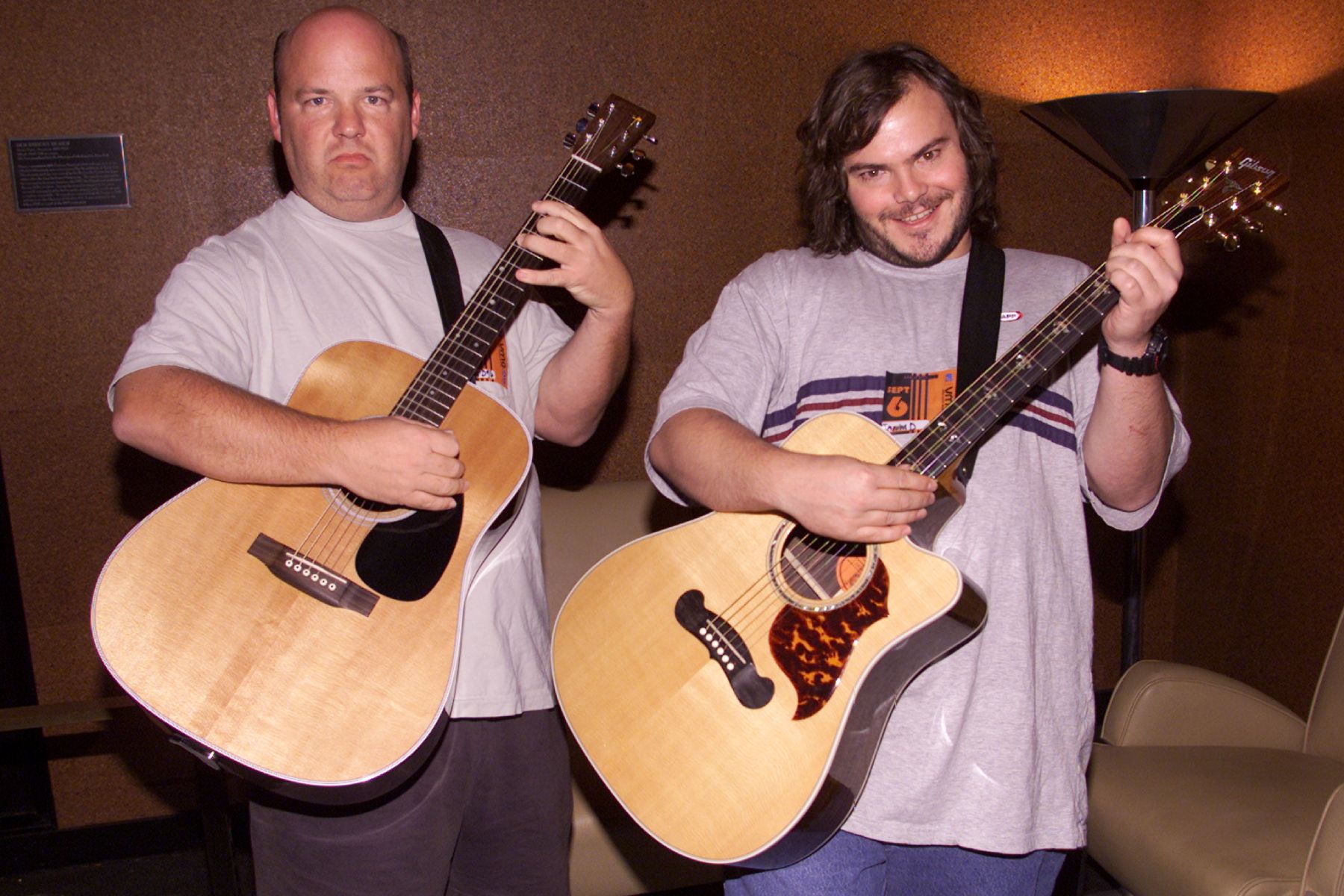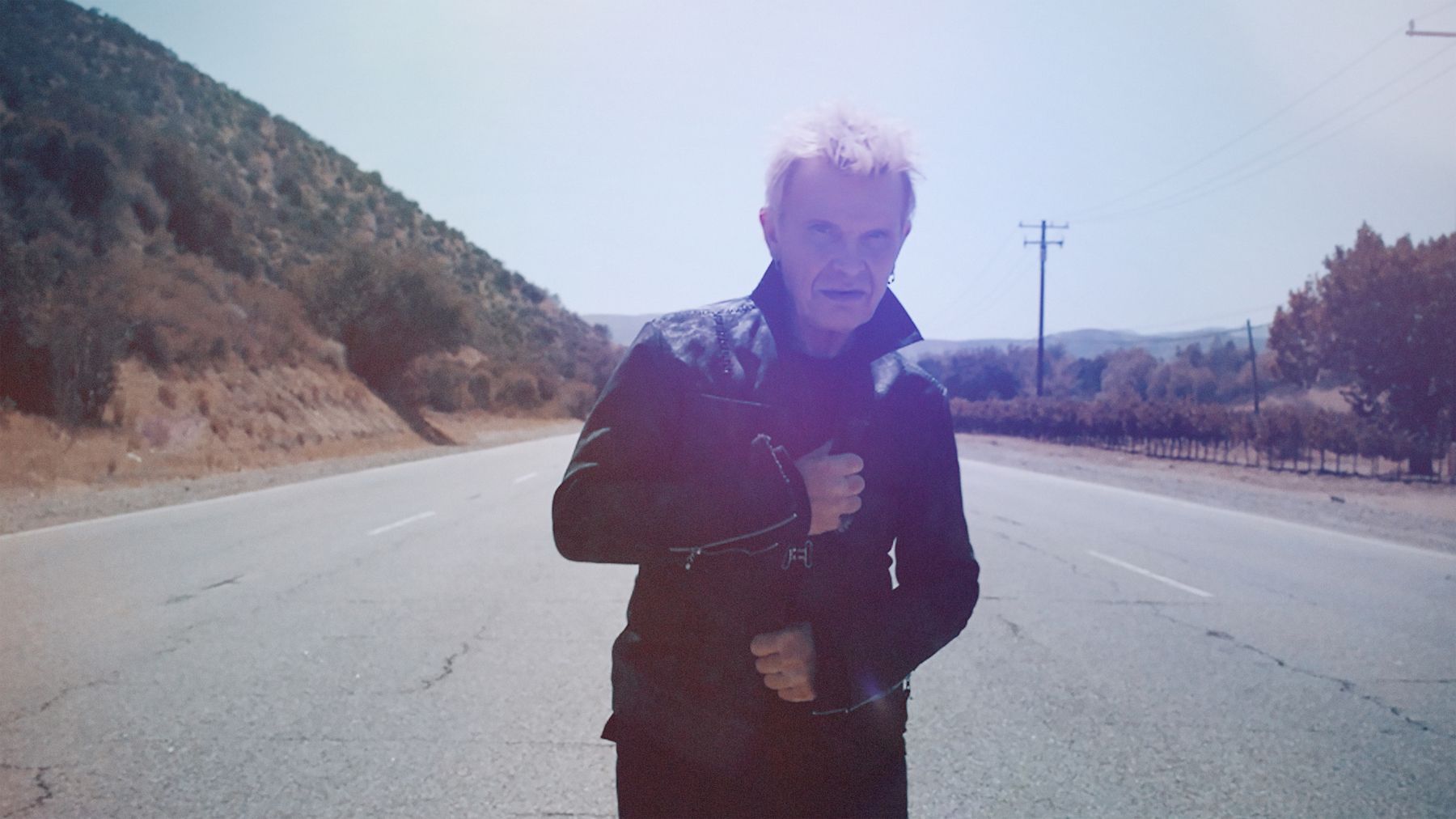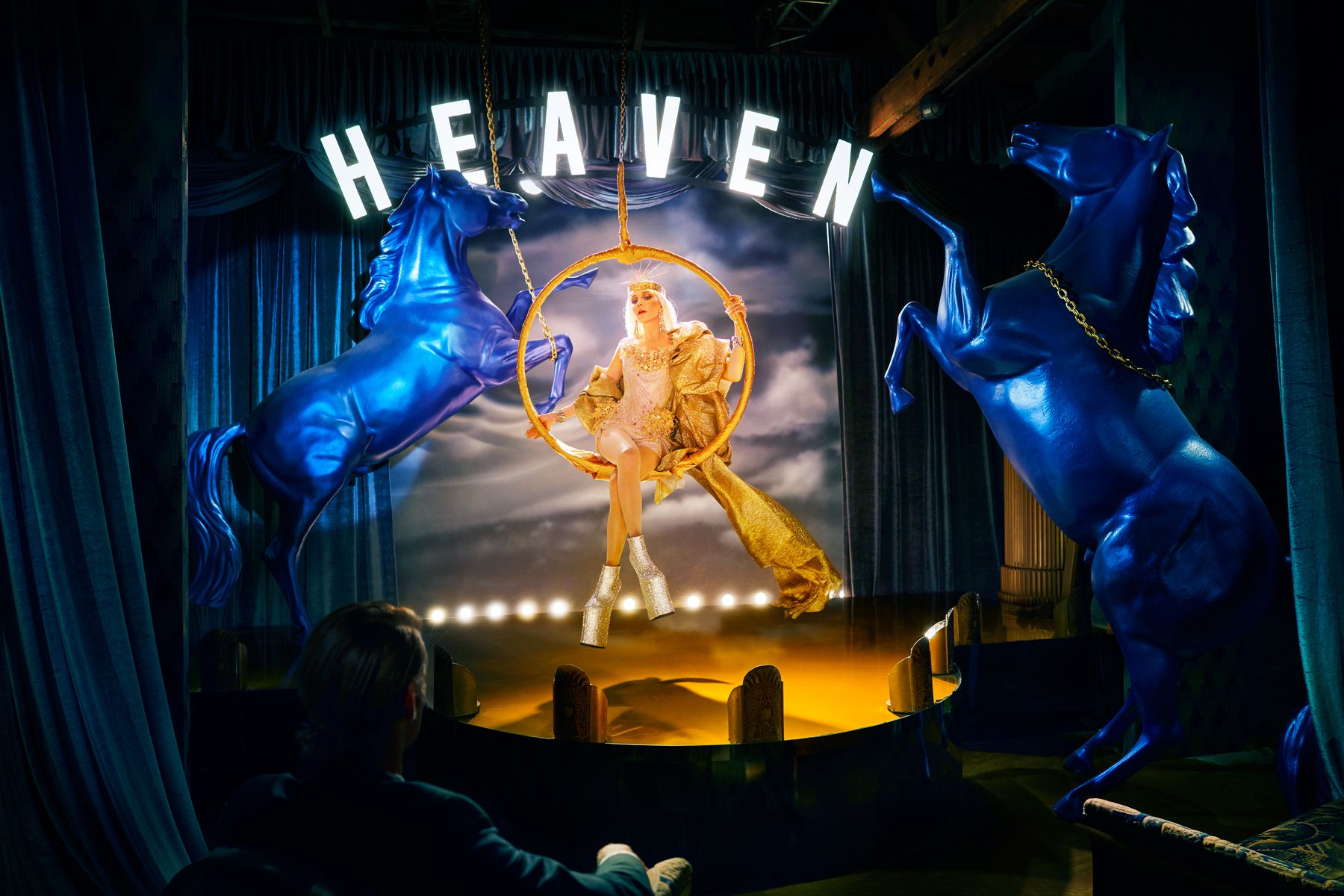
‘Anyone Can Rock’: Jack Black and Kyle Gass Reflect on 20 Years of ‘Tenacious D’
It’s a perfect rock & roll story, really, the kind always worth re-telling — the one about the night Jack Black and Kyle Gass officially arrived as Tenacious D. It was their first show ever, at a Los Angeles coffee shop called Highland Grounds, and in the crowd, eyeing these future legends, was an old master himself. Imagine the Rolling Stones debuting in front of Muddy Waters. Or the first time Whitney Houston sang for Aretha Franklin. That was Tenacious D, playing their debut concert for a crowd that included one Harry Shearer, also known as Derek Smalls of Spinal Tap.
“It was a magical christening; it was a sign,” Black recalls to Rolling Stone with some well-earned, but quintessential over-the-top grandeur. “There’s a member of Spinal Tap in the audience at the first Tenacious D show. It was meant to be.”
The duo, who are celebrating the 20th anniversary of their self-titled debut album on Saturday, September 25th, have always been hyper-attuned to the elements that simultaneously make rock and roll wonderful and worthy of ridicule. The big riffs, the big hooks, the big egos and, maybe most importantly, the big legends.
The duo’s signature song remains “Tribute,” a brilliantly warped take on the devil-at-the-crossroads myth that positions Tenacious D as a band capable of dumbfounding the Dark Lord by spontaneously playing the best song in the world, but one not exactly capable of remembering how that song actually went. Black and Gass giddily leaned into outrageous mythmaking of all kinds on Tenacious D — there’s fantasy epic “Wonderboy,” the revolutionary saga “City Hall” and the statement of grand canonical intent, “Dio,” in which the D stake their claim as the real successor to metal great Ronnie James Dio.
Twenty years later, the legend of Tenacious D itself seems more remarkable than, say, being able to kill a yak from 200 yards a way with mind bullets. This was a “fake” band that suddenly became a real one. For all their fans in comedy, they were wowing the likes of Dave Grohl (who later played on Tenacious D) and Weezer (who brought the D on tour with them) and even Dio himself (who would cameo in their 2006 movie Tenacious D in the Pick of Destiny). In an episode of the short-lived HBO Tenacious D show, Black goes to smash his guitar after a performance of “Tribute,” but — starving artist that he is — lays it down gently instead; when the D performed the same track on Letterman a couple years later, he was able to give his axe the mighty wack it deserved. But maybe their most incredible feat was arriving in the early 2000s, as the music industry was imploding, and managing to go gold in less than a year and platinum by 2005.
To mark the 20th anniversary of Tenacious D, the band has been dropping an array of goodies for fans in the form of an advent calendar that includes old behind-the-scenes footage, recreations of the album’s skits by the Independent Shakespeare Co. and Haim (who do a great rendition of “Drive-Thru”) and interviews with David Cross (an early fan who brought Tenacious D deeper into L.A.’s alt-comedy fold) and the album’s producers, the Dust Brothers. They’re also reissuing the album as a “Super Power Party Pack” with old demos and other rarities.
“It’s been rad to do a little doff of our cap to our first album,” Black says. “It was such a huge moment in our lives. So we knew we had to mark the occasion. It’d be weird not to. When you say, was it fun for us to do it? It’s not really for us. It’s for the fans. It’s only for the fans!”
You two really got to know each other in the Actors’ Gang theater troupe — tell me about that experience.
Kyle: It was kind of a political theater group, sort of progressive, but it was highly entertaining, based on a style from the Commedia Dell’arte.
Jack: The first time I saw you perform was in the Actors Gang. But you didn’t know that I was there. I was just a face in the crowd… But the friendship did not blossom until I entered the Actors’ Gang officially. I came in as a teenager into that world; we traveled the world. We went to Edinburgh Theater Festival in 1989. We go back to the Eighties.
Kyle: Yeah, hot tub time machine with us.
Jack: Yeah, we came from a politically active underground theater company. Very cool. If you were a young actor in Los Angeles in the Eighties, you wanted to be in the Actors Gang. It was the spot.
“We were like the ninjas of rock. We don’t use electric guitars. That’s for, you know — not-ninjas.” – Jack Black
Was music a big component of the work you were doing there?
Kyle: It was, and I was kind of the music guy. And then Jack came in and started blowing minds with these four-track home recordings that he was doing. And I was intimidated. I was a little threatened because he was obviously a wunderkid and I was the old guy playing the guitar. But, I wanted part of his world, really. I wanted some of his sauce.
Jack: And then you quit the Actors’ Gang for a while. You’re like, “I’m out of here, I’m done.”
Kyle: Well, I’m a temperamental guy!
Jack: And I was like, “Whoa, where’s Kage going?” And I kind of followed him out. I continued to work with the Actors’ Gang, but I followed Kage out into his side project world.
Kyle: My exile, really.
Jack: Yeah, into exile. And I was like, “I’ll still be your friend. Teach me your ways!”
Kyle: I appreciated it, you got me. My stock was low, I needed a friend.
Jack: Yeah, you finally knew I existed. Now you know, now you need me! But now we’re in the early Nineties at this point, and Kage taught me how to play guitar and we smoked a lot of weed and we wrote our first song. Well I don’t want to talk about the first song.
Kyle: OK, no that doesn’t count. I can’t believe you still don’t like the first song. [Ed. note: Tenacious D’s first song is a legitimately sincere break-up tune called “Melissa,” of which there are bootlegs floating around the internet.]
Jack: I hate it. But the first official song was “Tribute.” It took a long time to craft that masterpiece and it still remains one of our flagship songs; arguably our best song.
Kyle: It’s been downhill ever since.
Jack: We shot for the stars. And by God we we hit one.
Tell me about the earliest days of conceiving and developing Tenacious D, and how you settled on this very grandiose acoustic-metal style?
Kyle: Well, I think we almost needed a shield or something to hide behind, because Jack and I both find music a little embarrassing. You’re singing and exposing feelings in a traditional kind of way. So I think the comedic thing came naturally, and we’re both hilarious — I don’t know if you can tell. But I think that gave us a way to do it. And we love the big rock — I mean, Jack turned me on to some heavy rock that I really wasn’t into, and got me into Metallica.
Jack: Kyle was teaching me on acoustic guitar. He could play electric, but he didn’t have an amp at his house. He was acoustic through-and-through. And I was into it. I liked acoustic guitar. I didn’t feel like, “Eh, I wish we had electric.” I never felt that need. And I felt like, in a way, that was ours — it was like we were ninjas. Ninjas don’t use guns. We were like the ninjas of rock. We don’t use electric guitars. That’s for, you know — not-ninjas.
That’s always seemed part of the bit — to have these heavy metal-worshiping dudes who just play acoustic guitar anyway.
Jack: Me and Kage, we have slightly different musical influences, but where we met was Simon and Garfunkel. We both were deep into those jams. But I said, “Wait a second, Black Sabbath.” So that’s what we are. We’re basically Simon and Garfunkel and Black Sabbath mixed together. And that’s where the folk metal comes from.
Kyle: You turned me on to the idea that these guys, it was always about the devil worship and that whole Eighties thing. And it was really funny. Does Ozzy actually worship Satan, what’s up with that?
How have music and comedy been entwined for you? Not just “comedy music” as a genre, but were there songs that made you realize “serious music” could also be funny?
Jack: [Singing] “Hello Muddah. Hello Fadduh, here I am at Camp Granada.” Alan Sherman. Um, [Singing again] “He’s got big balls! She’s got big balls! But we’ve got the biggest balls of them all!” AC/DC. Funny, very funny. But let’s face it, the real goose in the caboose that led the way, the North Star, was Spinal Tap. Duh. Funniest movie ever made — with also, by the way, great rock songs. They were making fun of the genre, but they were also celebrating the genre. And Nigel Tufnel, it doesn’t get any funnier than that ever. It never has been funnier, and it never will be funnier. Maybe just as funny, in some cases. But, it goes to 11. What, is someone gonna go to 12?
Kyle: They did pave the way.
You had the Tenacious D HBO show before you made the album. How do you think that experience prepared you to make the record?
Kyle: We’d done a fair amount of live shows and then we had to actually record for the HBO show. So I think that got us in-tune to recording. But we were still pretty green recording with the Dust Brothers for the first time. But the experience of making the show was like, “Wow, this really works on some level. It’s really gaining a cult following and people dig it.”
Jack: It was a great way to work up material, because we had just a handful of songs when they said, “Hey, we want you to do some comedy short films to be part of the Mr. Show Cinematic Universe.” And so we wrote a few episodes with Bob [Odenkirk] and David [Cross], and the first few episodes were no problem because we already had enough songs for that. But then when we went further, we were like, “Oh fuck, we need more songs.” And we wrote a lot of songs to order; what do you call that Kage when you’re writing?
Kyle: You know, you put your order in, “I need a Sasquatch song to go.”
Jack: Yeah, we needed to write songs for the episodes. We wrote a lot of songs on assignment there. And then we had a big batch that we were able to go right into the studio after we were done with that TV gig.
In the advent calendar interview you did with John King of the Dust Brothers, you spoke about finally going electric, and John described it as fulfilling the fantasy embedded in the acoustic originals. What was it like for you guys recreating those songs with a full band for the first time?
Kyle: That was a dream come true. We were big rock fans, and then to hear our songs blown up like that, with Dave Grohl playing drums behind the little songs you came up with in your living room — that was pretty heady stuff for me. It was exciting, even though it was kind of a leap. But the Dust Brothers really made it clear, like, this is not unusual. You bring songs in and then you make a track. It’s a different art form, really, than the live thing. But it felt amazing. I remember I couldn’t stop listening to it the first time, I was like, “This is incredible, I can’t believe I’m on a rock album that sounds this good!”
Jack: It was cool fleshing out all those songs, but there was something magical in the time before we had an album, when we were on HBO and before we got a record contract. There’s a couple years in there where we were famous as a band and we were able to go and book big rooms and play in rooms all around the country without an album. We were like the most indie of all. We don’t even have a record label, that’s how indie our record label is — it doesn’t exist! Our music is in the air, or on the videotapes. We went to Seattle, and Eddie Vedder came to one of our shows before we had a record. He was just fucking there.
“I think people related to the episodes. The underdog, kind of shlumpy guys that are a little bit deluded, but are kind of good and actually funny. So you can laugh at them and with them — and tap your toe.” – Kyle Gass
So there was a reluctance when we first went into the studio with the Dust Brothers and they were like, “You gotta form a supergroup.” And we were like, “Do we, though?” Because the joke is, it’s these two guys with acoustic guitars playing heavy metal to the heavens, like we’re playing to a million people. Aren’t we going to lose that joke and that magic once we get a band? So we told them, “We’ll do it — but just so you know, at the last minute we may bail and just go acoustic.” And they were like, “Yeah, yeah, we’ll always have the acoustic versions and you guys can decide.” And then as soon as we started, it was like, “What were we talking about? This sounds so much better with the band. We’re not going to put out the acoustic!”
Kyle: There are a couple acoustic songs on there. I think that was important. It’s a good variety.
Eddie Vedder came to see you play, Dave Grohl is on the album, you toured with Weezer and Dio even became a fan — what do you think the allure of Tenacious D is for other artists?
Kyle: I think people related to the episodes. The underdog, kind of shlumpy guys that are a little bit deluded, but are kind of good and actually funny. So you can laugh at them and with them — and tap your toe.
Jack: We were saying, “Hey, anyone can do it.”
Kyle: Of course they can’t.
Jack: The radio will tell you that only very, very special people can do it. But we’re telling you that’s bullshit. Anyone can do it, anyone can rock. I think that’s where Brad Bird came up with Ratatouille, “Anyone can cook!” We’re the fucking rats from Ratatouille, dude!
Tenacious D has really remained a constant for both of you. What’s kept the band so exciting and creatively engaging?
Jack: You know, we’re still Tenacious from the block.
Kyle: It’s our thing and we get to be as artistic and creative as we want to be. That’s a rush; it’s the greatest thing. We’re actually working on some stuff right now, and when something comes out, I don’t know if there’s a better feeling. It’s the act of creation — it’s really exciting.
Jack: It’s like when you strike a gold mine, or like there’s a geyser of bubbling crude — like we struck oil, why would you stop pumping? Just keep pumping until it’s dry. It’s just bubbling crude. Now, will we someday bail and just go full electric. Maybe?
Kyle: We don’t know a thing. We’re slaves to the muse!
Jack: But right now? That black gold just keeps on a-spraying.




